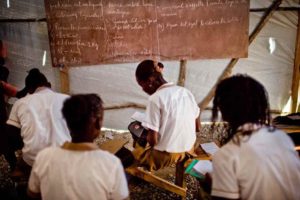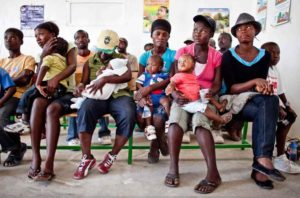By Ezra Fieser — Special to GlobalPost
Published: December 7, 2010 06:03 ET in The Americas
CROIX-DES-BOUQUETS, Haiti — When the government and aid agencies opened a camp here in April, Haitians displaced by the earthquake arrived in busloads to claim a new life outside of crippled Port-au-Prince.
Pushed by the international community and blessed by the government, Camp Corail differed from the Port-au-Prince camps that formed spontaneously when Haitians flocked to whatever open land they could find and threw together makeshift homes. Corail is the country’s only “official” camp.
Residents arrived to neatly spaced hurricane-proof tents on a barren swath of earth at the foot of mountains north of the capital.
From drinking water to latrines and plans for more permanent housing, everything was planned — except for the situation here today.
 The camp’s arranged tents are surrounded by tens of thousands of derelict shacks that crawl up mountainsides like ants on a hill. Squatters came to grab a piece of land, even though they’re here illegally. They constructed shacks with secondhand tarps, poached water from the bladders at Camp Corail and enrolled their children in its schools.
The camp’s arranged tents are surrounded by tens of thousands of derelict shacks that crawl up mountainsides like ants on a hill. Squatters came to grab a piece of land, even though they’re here illegally. They constructed shacks with secondhand tarps, poached water from the bladders at Camp Corail and enrolled their children in its schools.
“We’re in God’s hands, nobody is helping us here,” said Marilande Gostine, an elderly woman living under a tattered tarp roof.
Corail was boldly promoted as the Haitian government’s solution to a key post-earthquake dilemma: how to get earthquake survivors out of camps on highway medians, public parks and private land and into a more permanent— and legal — setting.
Instead, it has quietly become a symbol of the government’s ineptitude. Squatters continue to arrive daily — as many as 100,000 live there, according to one estimate — and the government continues to ignore them.
“The people there fall outside of the humanitarian agencies’ agreement, which was to work in the camps,” said Leonard Doyle, spokesman for the International Organization of Migration, an aid agency that coordinates humanitarian services at the camps. “Something has to happen … and it has to be a government response.”
Repeated calls and emails to government officials requesting interviews went unanswered. “Right now, the focus is the election,” said a representative in the prime minister’s office, declining to give his name.
For the people in settlements in Croix-des-Bouquets, the Nov. 28 election reinforced feelings of abandonment. Their polling place never opened on Election Day.
“They don’t recognize us — not the organizations in the camps or the government. We don’t get any assistance,” said Cicas Glionest, a preacher who set up a Baptist church with splintering wooden planks for pews.
Glionest lives in one of three large settlements. It’s named Jerusalem, but not much is blessed. Windswept and dry, it is more Sahara than Caribbean. Jobs are as scarce as sanitation — residents defecate into holes or into bags they throw onto fields.
“It’s a cholera time bomb waiting to happen,” said Bryant Castro, of American Refugee Committee who manages services at Camp Corail. The camp’s health clinic treated its first cholera case in late November when a man from one of the neighboring settlements stumbled over.
“Some [aid groups] have decided to go do some things outside of the camp, unilaterally, but when you’re talking about cholera, you need a coordinated response and that’s not happening,” he said.
Camp Corail is a snapshot of a larger issue in post-earthquake Haiti. Humanitarian agencies rushed to deliver basic services the government could not, like drinking water and latrines to the more than 1 million left homeless. The aid groups took over the services while the decimated government rebuilt itself. More than 10 months later, the government has made little visible progress.
“Oxfam went there to provide water and sanitation to the camp. Now there’s this tremendous need outside the camp where we can’t provide services,” said Julie Schindall, a spokeswoman for Oxfam. “With a disease like cholera, it’s well-known that it will spread from those areas where there are no services to areas that are served.”
Cholera had killed more than 1,817 people by Nov. 30, about six weeks after the outbreak began. Health agencies estimate the bacteria could sicken as many as 650,000 people in coming months.
The most vulnerable areas are those without regular access to clean drinking water and sanitation, like Jerusalem.
Castro said he warned the United Nations’ top humanitarian officer, Nigel Fisher, and government ministries directly and raised the issue at a “cluster” meeting, which brings together workers from various aid groups in an effort to coordinate the humanitarian response. He’s received no response.
Requests to interview Fisher went unanswered.
Corail-Cesselesse, as the area is known, was supposed to be the answer to the post-earthquake misery, not another headache.
Back in March, a ruined Port-au-Prince was filled with tent cities teeming with the more than 1 million people left homeless by the January quake that killed at least 230,000. Rubble and collapsed buildings marked nearly every street.
Going home was impossible for residents, the majority of whom rented. Houses were damaged and rents had tripled in some cases. Donors pledged millions with the expectation that new homes could be built.
Land to put those shelters on, however, was hard to come by. Enter Corail: untouched land between the Caribbean Sea and the mountains about 10 miles north of Port-au-Prince.
The location was less than ideal. It sits on a flood plain and the closest stores are 30 minutes away by public transportation, residents said. Aid groups had little opportunity to voice concerns. They were given 48 hours notice that the move was happening.
About 6,000 residents were selected from the spontaneous camp that had formed on the Petionville Golf Course in Port-au-Prince. Sean Penn’s humanitarian organization manages the camp.
The residents were moved into tents, with plans to soon move them to houses of plywood and concrete floors that could last several years. Aid agencies World Vision and the International Organization of Migration were charged with building the shelters, but by the time they began squatters had occupied zones where the homes were to be built.
Now there’s only space for 2,114 of the houses, Castro said.
“The government did nothing to control the land and prohibit it from being occupied,” he said.
The government charged Gerard-Emile Brun, an architect and developer who goes by “Aby,” with overseeing the relocation. He also owns much of the land.
“Home is here now, but the only problem is that we don’t have any money or jobs,” said Rodrigue Polinis, a father of two who was moved to a tent from the Sean Penn camp in April.
Polinis picks up occasional work driving a truck but it’s nothing steady. He’s raising pigeons and growing squash outside his tent but “when there’s no money, there’s no food.”
Polinis said unemployment, the lack of space at schools and the long line at water spigots are the camp’s biggest concerns.
“We don’t have any other places to get water,” said Elaine Fostin, who lives roughly 200 meters from the camp and sends her children and grandchildren to fill plastic buckets.
The humanitarian agencies are powerless because they have to provide services to everyone equally.
The camp has become a magnet of sorts, Castro said, that provides the services that keep attracting new residents to the settlements.
“We’re getting very close to violating the do-no-harm principle,” he said. “More people are arriving every day. You’re looking at potentially the next slums of Port-au-Prince.”





OIM should be careful of its criticism. Immediately after the earthquake we began our calls to IOM for assistance in camps all around PAP, Gressier, Leogane,etc. We asked them to work with the mayors and the Delegues to solve the problems in the camps. Numerous telephone calls and emails were sent to them asking for their assistance. For some reason, probably political, they did not respond. The only time they worked with a Delegue was when a signature was needed for them to do what THEY wanted to do. Up to this day, IOM has repeatedly ignored calls from some government officials who really wanted to help and were ignored.
They need to place blame where blame belongs. Make sure the finger is pointing back to them as well. The Haitian people did not deserve the games that were played with their lives after the earthquake and now, after cholera, and now, after the election. And now, and now, and now!
I’m an inventor in Dallas TX. I would like to talk to someone on the ground in Haiti about recycling plastic trash into building blocks for making shelters. This is an open source concept and no money is to be made off of it, only shelters.
I would love to speak with you about this. How can I contact you?